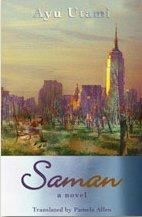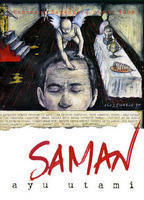 Novelnya Saman (ulasan Katrin Bandel) yang paling popular kini sudah diterjemahkan kepada bahasa Inggeris. Penerjemah Pamela Allen, seorang pensyarah kanan sastera di Universiti Tasmania, Australia.
Novelnya Saman (ulasan Katrin Bandel) yang paling popular kini sudah diterjemahkan kepada bahasa Inggeris. Penerjemah Pamela Allen, seorang pensyarah kanan sastera di Universiti Tasmania, Australia.Majlis peluncuran Saman [foto kanan] versi Inggeris (ulasan Marshall Clark) telah diadakan pada 30 Ogos (jam 7.30 malam) di Klub Rasuna, Kuningan, tidak jauh dari bangunan kedutaan Australia yang dibom pada September tahun lepas. Saya turut diundang, menarik juga juga ini!
Berikut saya petik coretan-coretan tentang Ayu Utami dari beberapa sumber:
(1) Ayu Utami, who created a literary sensation in Indonesia with her novel Saman, will launch the English translation of this highly-acclaimed and controversial story touching on female sexuality and the struggle between personal faith and political action. (Conscious Living)
(2) Lebih menarik jika anda membaca ulasan tentang Ayu dan dua lagi novelis yang membawa sastera bernafaskan isu-isu seksual, misalnya Djenar Maesa Ayu Jangan Main-Main (dengan Kelaminmu). Lihat More than just sex dalam Inside Indonesia (Okt-Dis 2004)
(3) Apa kata Pamela selanjutnya tentang projek penterjemahan Saman?
At a recent forum on literary translation, I was asked whether translation ultimately has the potential to be an act of betrayal. It was a powerful question, and one which in the end I had to answer in the affirmative.
In this paper I reflect on the process of translating the best-selling Indonesian novel Saman by Ayu Utami.
 When I began reading Saman soon after its publication in 1998, I couldn’t put it down. The novel took hold of me in many ways and for many reasons. It wasn’t only the narratorial style that takes the reader on a marvellous meandering journey through time and space.
When I began reading Saman soon after its publication in 1998, I couldn’t put it down. The novel took hold of me in many ways and for many reasons. It wasn’t only the narratorial style that takes the reader on a marvellous meandering journey through time and space.It wasn’t only the wonderfully crafted characters that come alive on every page. It wasn’t only the bold engagement with Indonesian socio-political realities.
It was all of the above plus perhaps most of all the language - language that is at once lyrical and descriptive, language that achieves just the right mix of metaphor, metonymy and realism, language that draws you in yet keeps you alert.
When I took on the task of translating the novel into English, the most difficult challenge was to keep that enticing linguistic mélange. I had to find the right tone, the right style and of course the right words.
More than that, I had to achieve what Ayu Utami does so well in Indonesian - a cinematographic effect, whereby the narrator describes what is, without attempting to explain or interpret, whereby the reader is presented with a visual panorama rather than a plot-driven narrative, whereby the subject is effectively removed from the text.
Thus began a long, arduous, but ultimately thoroughly rewarding process, which entailed much pondering, revising and tinkering with the text as well as collaboration with Ayu.
I can only hope that in the end I managed to avoid committing that act of betrayal. (Translating/Transgression?: Reflections on the translating of Ayu Utami's novel Saman, oleh Pam Allen)
 (5) Tentang biodata Ayu, saya ambil dari laman web program antarabangsa penulisan di Universiti Iowa.
(5) Tentang biodata Ayu, saya ambil dari laman web program antarabangsa penulisan di Universiti Iowa.Justina Ayu Utami (writer, editor; b. 1968, Indonesia). A co-founder of the union of freelance journalists, she was banned from writing in 1994, succeeding nonetheless in completing a black book on corruption in the Suharto regime. Her debut novel Saman (1998) treats freely love and sexuality, and addresses the difficult relationship between Muslims, Christians and the Chinese minority. It received the prize for the best Indonesian novel in 1998, with a companion novel Larung coming out in 2001. Both have been published in Dutch. Since 1998 Utami has been a radio host and co-publisher of the cultural magazine Kalam. (The University of Iowa International Writing Program)
Selain bakal menyertai program di Universiti Iowa, Ayu kini sedang menyunting terjemahan novel pemenang Nobel sastera tahun lalu, Elfriede Jelinek, Piano Teacher daripada edisi Inggeris dan Jerman. Novel ini telah difilemkan dengan judul yang sama.
+ * + * +
Akhir sekali, jika berminat melihat peranan karya kreatif dalam proses demokrasi, atau menentang pemerintahan autoritarian, di Indonesia, lihat di sini Seno Gumira Ajidarma and fictional resistance to an authoritarian state in 1990s Indonesia oleh Michael H Bodden (Awas! Format PDF)
(halaman ini dikemas kini pada 3 Sept, terbitan asal 20 Ogos)



6 comments:
Harap tulisan dia kini akan dapat sambutan yang lebih gemilang dari kumpulan orang yang tidak bisa membacanya dalam bahasa asal. Terutamanya kat Malaysia dan Singapura.
masa jumpa ayu di pelita, dia ada beritahu tentang the piano teacher, dia sedang mengerjakan terjemahan novel yang telah difilemkan. tetapi bila aku menonton dvd filem tu, tak sangka/jangka filem itu diangkat dari novel nobel laureate, kerana tema voyeurism, masochistics senang kata pervert la (hehe). selalunya yang menang hadiah nobel, karya mereka selalunya politikal mcm marquez, coetzee dan gordimer.
pasal seno, mmg best cerpen dia. clara, telefon dari acheh dan satu yang aku tak boleh lupa cerpen Bebek Donald. cerpen satira yg gunakan watak donald duck dan uncle donald.
cuma masalahnya fathi, susah aku nak buku dia kat sini. so sebelum balik kalau jumpa sambar la 3/4 buah kat aku.
Macam biasalah, novel Malaysia/Indonesia - muka depan huduh nak mampus. Nak kata orang melayu ni buta desain idak gak...
Good design!
[url=http://zipfjjbd.com/touu/uqer.html]My homepage[/url] | [url=http://efoubnyx.com/tqre/lkdi.html]Cool site[/url]
Good design!
My homepage | Please visit
Nice site!
http://zipfjjbd.com/touu/uqer.html | http://oprbovkk.com/xldy/dbvg.html
Post a Comment